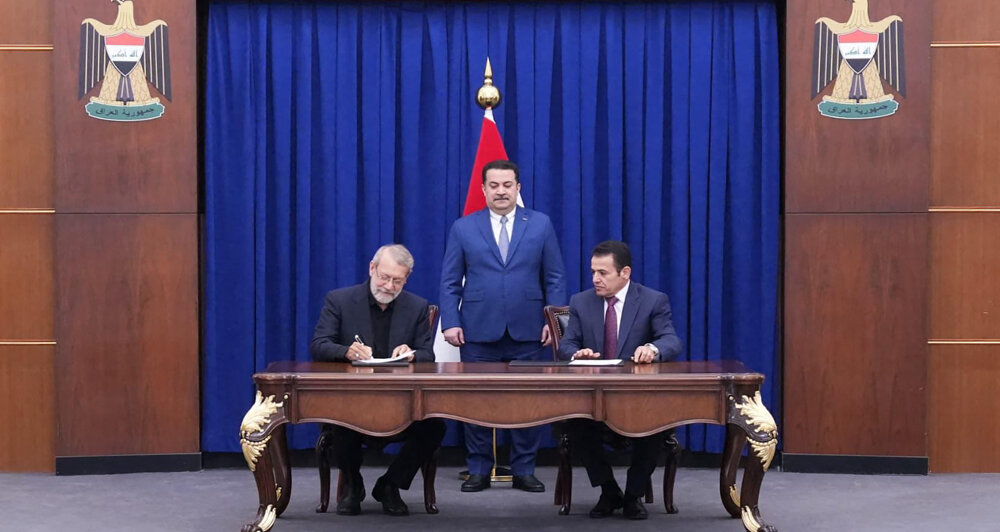Tehran-Baghdad security agreement prevents foreign interference: Iran’s top security official

TEHRAN – Iran’s Supreme National Security Council Secretary Ali Larijani has stressed that Tehran and Baghdad must not allow third parties to undermine their shared security and stability, pointing to the recently signed Iran-Iraq security agreement as a model for regional cooperation.
Speaking in an interview with a televised program on IRIB Channel 2, Larijani discussed his first official trip to Iraq and Lebanon in his new role, and outlined Iran’s broader security outlook. He said regional issues remain at the core of Iran’s national interests and security strategy.
“Without doubt, regional matters have always been central to our national security. The Islamic Republic’s strategy is built on attention to these regional dynamics,” he said.
Larijani explained that two opposing approaches dominate the security landscape. “One theory, openly voiced by the United States and Israel, claims peace can only come through power. This essentially means either submission or war, and the result of such thinking is chaos in the region—as we clearly see in Syria,” he noted.
“The second theory,” he continued, “is achieving lasting security through the participation of regional states, where all countries are empowered. This is the approach Iran pursues. Instead of fueling instability, we seek to build stability. A clear example is the security agreement we signed with Iraq during this trip, aimed at creating a stable security environment together.”
Larijani said the central point of the Iran-Iraq pact is that both sides pledge to prevent any group, actor, or foreign state from disturbing their mutual security or using one country’s territory against the other. “We must not allow third parties to infiltrate or disrupt the security of our two nations,” he stressed. He added that his trip also included discussions on strengthening cultural and economic cooperation.
On broader regional developments, Larijani said the U.S. and Israel have consistently sown turmoil. He recalled former U.S. Secretary of State Hillary Clinton admitting that Washington had created Daesh. “They did this to cause problems for Iran and Iraq, or to inflame Shi’a-Sunni divisions, despite the fact that these communities had lived together for years. They exaggerated these differences to create discord. Some regional states also interfered in this matter,” he said.
He emphasized, however, that the recent confrontation was different. “This time it was face-to-face. The Americans had always hidden behind regional events, but now they came onto the stage themselves. Their defense secretary explicitly ordered bombings, and the Pentagon admitted it had spent ten years preparing for this attack.”
Larijani said the Israeli assault prompted a strong national response inside Iran. “The people developed a unified understanding that Israel had to be confronted. Even individuals who had previously opposed aspects of the government joined demonstrations, saying they came out because Israel had attacked.”
He added that one regional leader told him: “The world has now seen Iran’s national solidarity.” Larijani described this as a vital cultural, political, and social asset.
The top security official said Washington and Tel Aviv regime had assumed Islamic countries would distance themselves from Iran, but events proved the opposite. “Islamic governments and peoples stood behind Iran, while Europeans aligned themselves with the U.S. and Israel,” he said.
Larijani also detailed Iran’s military response. “The enemy believed its defenses were unmatched, but midway through the conflict, Iran’s missile strikes left them completely bewildered. A senior regional official told me Netanyahu called him on the first day of the war saying Iran was finished. By the fourth or fifth day, when I called, he admitted they were in serious trouble.”
He described Iran’s military operations against Israel as a major achievement, while acknowledging shortcomings. “The enemy’s infiltration inside Iran is a serious issue. We had painful weaknesses, but also significant strengths that must be recognized,” he said.
Quoting the U.S. President Donald Trump, Larijani noted: “Trump said that in the final days it was a hellish situation for both us and Netanyahu, and that he saved Netanyahu.”
Still, Larijani cautioned against complacency. “We must not grow arrogant. The enemy studies these developments and devises new methods. We must do the same and avoid relying on a single military approach,” he concluded.
Iran and Iraq signed a memorandum of understanding to boost security along the shared border on August 11.
Previously on March 2023, Iran and Iraq had signed a security agreement that included coordination in protecting the border between the two countries. The agreement was mostly due to rising terrorist activities in the Iraqi Kurdistan region. Responding to the activities, Iran’s Islamic Revolution Guards Corps (IRGC) had launched several rounds of airstrikes against their positions since September 24, 2022, vowing to continue the attacks till the groups are unarmed.
The newly-signed agreement caused backlash from the U.S. officials. The State Department spokeswoman Tammy Bruce said on August 12 that Washington supports “genuine Iraqi sovereignty, genuine Iraqi sovereignty, not legislation that would turn Iraq into an Iranian satellite state.”
In response, Iraqi officials stressed that the agreement is not entirely new. National Security Advisor al-Araji said the provisions had already been in place for some time.
The Iraqi Embassy in Washington also reaffirmed the country’s independence, stating: “Iraq is not subordinate to the policy of any other state, and that its decisions are guided solely by its independent national will.”
Leave a Comment